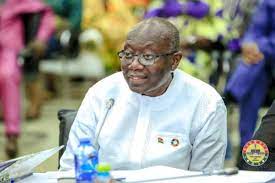Ghana to receive second $600 million tranche of IMF bailout after reaching staff-level agreement
Upon the completion of the Executive Board review, Ghana stands to gain access to SDR 451.4 million (approximately $600 million). This additional inflow will bring the total IMF financial support disbursed under the arrangement since May 2023 to SDR 902.8 million (about $1.200 billion).
- Advertisement -
Ghana is set to receive the second tranche of $600 million of the $3 billion IMF bailout after reaching staff level agreement.
This comes after the International Monetary Fund (IMF) staff team, led by Mission Chief for Ghana Stéphane Roudet, successfully concluded meetings in Accra, spanning from September 25 to October 6, 2023. The purpose of these meetings was to assess the progress of reforms and the government’s policy priorities as part of the first review of Ghana’s three-year economic program under the Extended Credit Facility (ECF) arrangement.
- Advertisement -
In a press statement, Mr Roudet announced that the IMF staff and Ghanaian authorities have reached a staff-level agreement on the first review of Ghana’s economic program under the ECF arrangement. This agreement, however, remains subject to approval by the IMF management and consideration by the Executive Board, contingent on the receipt of necessary financing assurances.
- Advertisement -
Mr. Roudet emphasized that securing an agreement with official creditors on debt treatment aligned with program parameters is essential to provide the required financing assurances.
Upon the completion of the Executive Board review, Ghana stands to gain access to SDR 451.4 million (approximately $600 million). This additional inflow will bring the total IMF financial support disbursed under the arrangement since May 2023 to SDR 902.8 million (about $1.200 billion).
- Advertisement -
Mr. Roudet acknowledged Ghana’s commitment to the Fund-supported program, highlighting strong fiscal performance and progress in lowering the fiscal primary deficit by about 4.0 percentage points of GDP in 2023. The government has adhered to program spending limits and expanded social protection programs to support vulnerable populations during economic crises. Ghana has also met its non-oil revenue mobilization targets, driven by ambitious structural fiscal reforms aimed at enhancing revenue collection, improving spending efficiency, strengthening public financial and debt management, and enhancing transparency.
In light of Ghana’s commendable performance under the Fund-supported program, the critical next step is to secure an agreement with official creditors on debt treatment consistent with IMF Executive Board-approved program parameters and debt targets. Mr. Roudet urged official creditors to expedite this process and reach an appropriate debt treatment agreement aligned with the financing assurances provided in May 2023.
Despite facing severe economic and financial challenges, Ghana has demonstrated resilience through its adjusted macroeconomic policies, successful domestic debt restructuring, and the implementation of comprehensive reforms. These measures have already yielded positive results, with growth in 2023 proving more robust than initially anticipated. Additionally, inflation has decreased, fiscal and external positions have improved, and the exchange rate has stabilized.
Source: Newsalertgh
- Advertisement -



